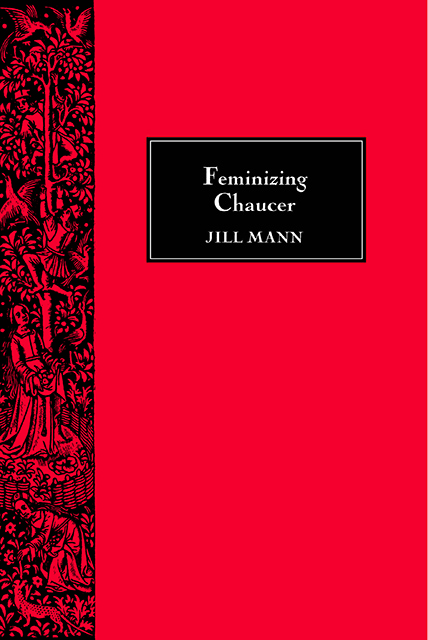Book contents
- Frontmatter
- Contents
- Dedication
- Preface to the 2002 Edition
- Preface
- Abbreviations
- Introduction
- 1 Women and Betrayal
- 2 Antifeminism
- 3 The Surrender of Maistrye
- 4 Suffering Woman, Suffering God
- 5 The Feminized Hero
- Conclusion
- Excursus: Wife-Swapping in Medieval Literature
- Chaucer Studies
- Bibliography
- Index
4 - Suffering Woman, Suffering God
Published online by Cambridge University Press: 17 March 2023
- Frontmatter
- Contents
- Dedication
- Preface to the 2002 Edition
- Preface
- Abbreviations
- Introduction
- 1 Women and Betrayal
- 2 Antifeminism
- 3 The Surrender of Maistrye
- 4 Suffering Woman, Suffering God
- 5 The Feminized Hero
- Conclusion
- Excursus: Wife-Swapping in Medieval Literature
- Chaucer Studies
- Bibliography
- Index
Summary
‘Wommen are born to thraldom and penance,
And to been under mannes governance.’
(Man of Law's Tale 286–7)The marriage that begins the Man of Law's Tale is not the culmination of a romantic courtship; instead, Constance, its heroine, is the instrument of a politico-religious alliance. Although he has never set eyes on her, the Sultan of Syria falls so passionately in love with her by reputation alone that he engages that he and all his baronage will embrace Christianity if he can have her as his bride. The matter is settled, not by the delicate negotiation of feeling, but ‘by tretys and embassadrie,/And by the popes mediacioun,/And al the chirche, and al the chivalrie’ (233–5) – everyone, it appears, being consulted but Constance herself. She accepts her fate without protest, but also without enthusiasm. The day of her departure for Syria is a day of sorrow, for both Constance and the members of her family, which on Constance's side at least represents not only regret at what she is leaving behind, but also fear of what she is going to.
Allas, what wonder is it thogh she wepte,
That shal be sent to strange nacioun
Fro freendes that so tendrely hire kepte,
And to be bounden under subjeccioun
Of oon, she knoweth nat his condicioun?
Housbondes been alle goode, and han been yoore;
That knowen wyves; I dar sey yow na moore. (267–73)
An everyday tragedy, one might say. Constance's fate must have been the fate suffered by multitudes of medieval women (and men too) whose marriages were dictated not by individual choice but by the accumulation of landed estates or the forging of political alliances. The narratorial comment encourages us to see the situation in its most bleakly depressing aspect, but Constance herself renounces the protest for which its cynicism seems to make room, accepting her fate with Stoic resignation as the general lot of women, as she takes leave of her parents for the last time:
‘Allas, unto the Barbre nacioun
I moste anoon, syn that it is youre wille; But Crist, that starf for our redempcioun
So yeve me grace his heestes to fulfille!
I, wrecche womman, no fors though I spille!
Wommen are born to thraldom and penance,
And to been under mannes governance.’ (281–7)
- Type
- Chapter
- Information
- Feminizing Chaucer , pp. 100 - 128Publisher: Boydell & BrewerPrint publication year: 2002

